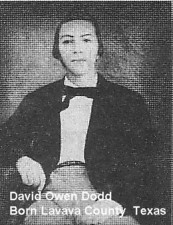David Owen Dodd (David Owen Dodd)

Civil War Confederate Folk Figure. He was known as the “Boy Martyr of the Confederacy”. A native of Lavaca County, Texas, he relocated with his family to Arkansas during his formative years. At the commencement of the Civil War in 1861, the Dodd family was settled in Little Rock where young David was in studies at the St. John’s Masonic College. After determining his age prevented him from entering Confederate service, he accepted an apprenticeship at the local telegraph agency where he excelled and mastered the essentials of Morse code. During a period in 1862, he held a telegraphers position in Monroe, Louisiana deciphering and transmitting Confederate communications. He subsequently joined his father, a proprietor of a suttlery, and was regularly charged with the responsibility of this business during the senior Dodd’s absence. The September 1863 news of Federal forces occupying Little Rock prompted his return home to make certain the safety of his mother and sisters. With the family’s removal to a secure location, the elder Dodd prompted his son to return to Little Rock to reconcile the family’s business affairs. General James F. Fagan, a family acquaintance, provided the necessary papers that would guarantee his safe passage through Confederate lines. At his departure, Fagan deliberately or unintentionally encouraged the youthful Dodd to prepare a “full report” of his trip to the Federal occupied city. His journey to Little Rock was uneventful and with the completion of his responsibilities, he applied and was granted a pass from Union authorities to return to his family. On the return trek, he was nearing his uncle’s home when he came upon a Union guard post. In view of the fact that his purpose was beyond the Union perimeter, the sentinel reasoned that Dodd had no further use for the pass and kept it. The following day, he became disorientated during a storm and accidentally journeyed back into Federal lines and into another sentry outpost. He explained the lack of a pass and with the inability to authenticate the account; he was brought in for questioning. During a search of his personal effects, papers with Morse code messages were found in his boot. He was charged with being a spy after the code was transliterated to reveal Union military matters. A trial was assembled and at its conclusion, he was found guilty and sentenced to death by hanging. General Frederick Steele offered several conditional reprieves to the condemned; name your accomplices and your life will be spared. In each instance, Dodd refused. It is often suggested that he was protecting the identity of Mary Dodge, a Vermont native and daughter of a Unionist father. With his scheduled execution approaching, he wrote his family that he was “prepared to die” and that he will see them “in heaven”. Positioned on the gallows to receive the hangman’s noose, he again refused a stay of execution saying to General Steele that he cannot “betray a friend”. Moments before his bungled execution in front of several thousand people, the seventeen year old Dodd made his last words known; “If I am to die I want to die like a man.” (bio by: Stonewall)
Born
- November, 10, 1846
- USA
Died
- January, 01, 1864
- USA
Cemetery
- Mount Holly Cemetery
- Arkansas
- USA

